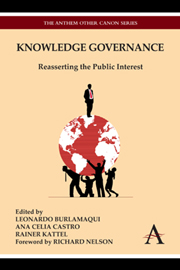Book contents
- Frontmatter
- Contents
- List of Abbreviations
- List of Tables and Figures
- Foreword
- Introduction
- Part I Knowledge Governance: Building a Framework
- Part II Innovation, Competition Policies and Intellectual Property: Institutional Fragmentation and the Case for Better Coordination
- Part III Going Forward: Towards a Knowledge Governance Research Agenda
- 7 Varieties of Latin American Patent Offices: Comparative Study of Practices and Procedures
- 8 An Interoperability Principle for Knowledge Creation and Governance: The Role of Emerging Institutions
7 - Varieties of Latin American Patent Offices: Comparative Study of Practices and Procedures
from Part III - Going Forward: Towards a Knowledge Governance Research Agenda
Published online by Cambridge University Press: 05 April 2013
- Frontmatter
- Contents
- List of Abbreviations
- List of Tables and Figures
- Foreword
- Introduction
- Part I Knowledge Governance: Building a Framework
- Part II Innovation, Competition Policies and Intellectual Property: Institutional Fragmentation and the Case for Better Coordination
- Part III Going Forward: Towards a Knowledge Governance Research Agenda
- 7 Varieties of Latin American Patent Offices: Comparative Study of Practices and Procedures
- 8 An Interoperability Principle for Knowledge Creation and Governance: The Role of Emerging Institutions
Summary
Introduction
The lack of soundness of the patents granted in an environment prone to uncertainty can be detrimental to the generation and transfer of technology and, potentially, could disturb the technological catching-up processes of developing countries. This conceptual flaw is the reason for the statement that a better definition of the criteria for novelty, inventive activity and utility are among the priorities for a possible positive agenda for patent examinations. Thus, developing countries are concerned with the possibility that TRIPS harmonization would limit their ability to contest patent protection restrictions and also the incorporation of their companies in the relevant international innovation networks. The idea of descriptive sufficiency also deserves some attention. It is self-evident that, in the case of developing countries at least, it would seem advantageous to draw the greatest possible amount of information from the process of granting patent privileges.
In this context, it can be useful to reveal the nature of the research for precedence and examination processes for patents, verifying the extent of the research universe, the interpretation accorded to each criterion and the organization of the interaction between the depositing company and the patent office. It is hoped to ascertain the manner in which each of these offices determines the scope of the patents granted. But on the other hand, it is possible to conjecture that some patent offices, in Latin America or elsewhere, do not enroll in examination processes for granting patents, taking into consideration patent examination done abroad.
- Type
- Chapter
- Information
- Knowledge GovernanceReasserting the Public Interest, pp. 165 - 198Publisher: Anthem PressPrint publication year: 2012

